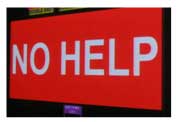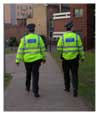Why This is Important

Public safety agencies (fire, emergency medical services, and law enforcement) are typically funded and staffed to meet the demands of “normal” emergencies and number of 911 calls. A disaster can overwhelm local resources. Traditionally, the shortfall is made up first through reserves (retirees, volunteers, overtime), and then assistance from neighboring departments. If the disaster is very large, state and possibly federal assistance is requested.
Pandemic flu will challenge this way of doing things. Emergency service providers are not immune to the flu virus - no one is. Neighboring departments will be overwhelmed with their own problems, as will state and federal agencies.
“Local communities will have to address the medical and non-medical effects of the pandemic with available resources. This means that it is essential for communities, tribes, states, and regions to have plans in place to support the full spectrum of their needs over the course of weeks or months.”
Department of Homeland Security, National Strategy for Pandemic Influenza |

This means:
- We are on our own.
- Communities AND individuals will be forced to cope with this with whatever resources they already have at the time.
Impact on Public Safety Agencies

During a pandemic, public safety agencies can anticipate:
- Reduced staffing because of sickness and death. Staffing may be augmented with retired and reserve personnel, but this cannot be assured.
- Long hours in a stressful environment.
We do NOT expect the National Guard to be available to assist at the local level. The National Guard will have competing requirements such as protecting the country and guarding vaccine facilities and supplies. They will NOT have the manpower to go door-to-door to help with feeding and injuries and law enforcement.
What You Can Expect
Mild Pandemic: Public safety agencies will identify and prioritize essential services. The following are EXAMPLES ONLY of how a controlled reduction of services could be implemented. Each jurisdiction will be making its own plans, based on its unique needs and resources.

- Law enforcement. Suspend certain services such as fingerprinting and vehicle registration checks. Focus on the core, essential public safety activities of dispatch and patrol, intervention/interdiction, enforcement, and arrest/detention.
- Fire Services. Suspend routine inspections; suspend education and awareness presentations.
- Emergency Medical Services. Cancel non-emergency transfers.
Severe Pandemic: You can expect public safety agencies to seriously degrade or fail. The default position will be to do the most good for the most people, with resources and personnel available. Do not expect law enforcement response to a burglary. Do not expect timely response to a kitchen fire. Do not expect ambulance transfer to a hospital that has been closed.
What You Can Do:
1. Support your public safety agencies. Contact them to see how you can help now, before a pandemic.
2. Adjust your expectations to what is truly essential. Limit 911 calls to true emergencies- for example, anything that might result in loss of life, limb or eyesight.
3. Work on making your home more accident-proof by observing important home safety recommendations. For example:

- Prevent fires: Get fire extinguishers for every floor, as well as extra extinguishers for the kitchen, garage, workshop, in each car, and by any open heat sources such as fireplaces. Have a service person check heaters, stoves, and fireplaces every year. Clean dryer lint traps as recommended by. Have smoke detectors in every bedroom and on every level of the house. Have carbon monoxide detectors. Check batteries once a month and replace twice a year, such as at the daylight savings time change. Removed batteries can be used in non-critical devices, like electronic games.
- Prevent falls: According to the home safety Council, the #1 way people get hurt in the home is by falling. Use good lighting and handrails on stairs. Install non-slip grips and a grab bar in the bathtub or shower.
- Prevent poisoning: Keep medications and chemicals in child-resistant packaging, and lock them up.
Visit the Safe Kids USA web site to create your own
home-safety checklist with many more ideas for making your home as accident proof as possible.